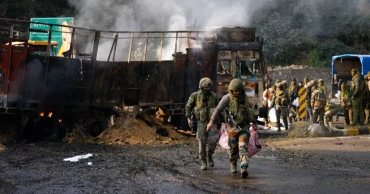Rebels
At least 22 people killed by rebels in eastern Congo: Mayor
At least 22 civilians were killed by extremist rebels in eastern Congo - the group's second large-scale deadly attack of the week, local authorities said Saturday.
Fighters with the Allied Democratic Forces — which has ties to the Islamic State group — attacked people in Beni territory in North Kivu province late Friday evening, said Nicolas Kambale, the mayor of Oicha commune where the attacks occurred.
“The enemy killed them savagely and as we speak we have at least 22 civilians killed who are already in the morgue,” Kambale said Saturday.
Violence has been simmering in eastern Congo for decades where some 120 armed groups have been fighting over land, resources, power and some to defend their communities. Attacks by rebel groups like ADF have increased recently. Since April last year, ADF attacks have killed at least 370 civilians and abducted several hundred more, including a significant number of children, according to the United Nations.
The group, which originally operated in North Kivu province, has spread to neighboring Ituri province, where more than 144,000 people have been displaced between January and February, according to the U.N. Efforts by Congo’s army and Ugandan forces to push them back have yielded little results.
Friday's attack came days after ADF killed more than 30 civilians, including women and children, between the Irumu and Mambasa territories in Ituri.
A spokesman for Congo's army in Beni, Capt. Antony Mwalushayi, said the attack Friday was in retaliation for large-scale offensives that the military has been conducting in the area.
2 years ago
Yemen rebels, Saudis in back-channel talks to maintain truce
Amid Yemen’s longest-ever pause in fighting — more than nine months — Saudi Arabia and its rival, the Iranian-backed Houthi rebels, have revived back-channel talks, hoping to strengthen the informal cease-fire and lay out a path for a negotiated end to the long civil war, according to Yemeni, Saudi and U.N. officials.
The quiet is fragile, with no formal cease-fire in place since a U.N.-brokered truce ended in October. It has been shaken by Houthi attacks on oil facilities and fiery rhetoric from Yemen's internationally recognized government, allied with Saudi Arabia, which complains it has so far been left out of the talks. Lack of progress could lead to a breakdown and a renewal of all-out fighting.
But all sides appear to be looking for a solution after eight years of a war that has killed more than 150,000 people, fragmented Yemen and driven the Arab world’s poorest country into collapse and near starvation in one of the world’s worst humanitarian crises. Saudi Arabia restarted indirect exchanges with the Houthis in September, when it became clear the U.N.-brokered truce wouldn’t be renewed. Oman has been acting as intermediary.
“It’s an opportunity to end the war,” a U.N. official said, “if they negotiate in good faith and the talks include other Yemeni actors.” Like other officials, the U.N. official spoke on condition of anonymity because of the fragility of the talks.
Read more: Yemen official says Houthi rebel missile hits city, kills 14
A Saudi diplomat said his country has asked China and Russia to exert pressure on Iran and the Houthis to avoid escalations. Iran, which has been regularly briefed on the talks by the Houthis and the Omanis, has so far supported the undeclared truce, the diplomat said.
Yemen’s war began when the Houthis descended from their strongholds in northern Yemen and seized the capital of Sanaa in 2014, forcing the internationally recognized government to flee to the south then into exile in Saudi Arabia.
Saudi Arabia entered the war in 2015, heading a military collation with the United Arab Emirates and other Arab nations. The coalition, which was supported by the United States, carried out a destructive bombardment campaign and backs government forces and militias in the south. The conflict became a proxy war between regional foes Saudi Arabia and Iran.
Neither side has made territorial gains for years. The Houthis maintain their grip over the north, Sanaa, and much of the heavily populated west. The government and militias hold the south and east, including the key central areas with most of Yemen’s oil reserves.
The war has bled beyond Yemen’s borders, with the Houthis attacking Saudi Arabia and the UAE with ballistic missiles and explosive-laden drones. The rebels also attacked vessels in the Red Sea. They used weapons from the stockpiles they seized in Sanaa and weapons supplied by Iran, according to independent and U.N. experts and Western nations.
Saudi Arabia and the Houthis have held indirect negotiations in the past, mainly for prisoner swaps or sporadic cease-fires.
Read more: Dhaka welcomes latest peace move in conflict-torn Yemen
The most ambitious talks, in 2019, helped stop a government’s advance on the Houthi-held port of Hodeida on the Red Sea. But Saudi officials accused the rebels of using an undeclared truce to make territorial gains and advance on the prized, government-held city of Marib. A monthslong battle for Marib ensued, in which the Houthis suffered huge casualties and were eventually repelled in late 2021.
The U.N. brokered a more formal truce that began in April 2022 and was extended twice. It ran out in October. Houthi attacks on oil facilities in government-controlled areas have been the most significant disruption in recent months — but so far, the warring sides have not resumed full-fledged fighting.
“An escalation would be costly on all fronts,” a Yemeni government official said. Still, “all are building up for the next round (of war) if U.N. efforts and the Saudi-Houthi talks collapse.”
One problem is that past attempts at resolution have been hampered by the conflicting interests of the powers involved in the war — Saudi Arabia, the UAE and Iran, said Abdel-Bari Taher, a Yemeni commentator and former Journalists' Union head.
“These talks won’t lead to concrete conclusions if they don’t include all Yemeni parties in the process,” Taher said.
The Houthis’ chief negotiator, Mohammed Abdul-Salam, said visits to Sanaa by Omani officials show the Houthis’ seriousness. The most recent visit ended Sunday.
“There is give and take with other parties,” he said, in an apparent reference to Saudi Arabia.
The kingdom has developed a phased roadmap for a settlement, which has been backed by the U.S. and the United Nations, said the U.N. official. In it, the coalition makes a number of key promises, including to further reopen the airport in Sanaa and ease a blockade on Hodeida, the official said.
The Houthis demand the coalition pay salaries of all state employees — including the military — from oil and gas revenues, as well as open all airports and ports under Houthi control. A Houthi official involved in the deliberations said the Saudis had promised to pay the salaries.
The Saudi diplomat, however, said paying military salaries is conditioned on the Houthis accepting security guarantees, including a buffer zone with Houthi-held areas along the Yemeni-Saudi border. The Houthis also should lift their blockade on Taiz, Yemen's third largest city, he said.
The Saudis also want the Houthis to commit to joining official talks with other Yemeni stakeholders, the diplomat said.
The Houthi official said his side has not accepted parts of the Saudi proposal, particularly the security guarantees, and refuses the resumption of oil exports from government-held areas without paying the salaries. The Houthis proposed a distribution of oil revenues according to a pre-war budget, the official said. That means Houthi-held areas receive up to 80% of the revenues since they are the most populated, according to the official.
The Saudi diplomat said both sides were working with Omani officials to develop the proposal to be “more satisfactory for all sides,” including other Yemeni parties.
All of this has left the internationally recognized government without a voice, a Yemeni government official said. He said the government’s presidential council worries Saudi Arabia “might give unacceptable concessions” to reach a deal.
But the Yemen anti-Houthi alliance remains riven with internal divisions so there is little room to maneuver.
“We have no option but to wait and see the conclusion of these negotiations,” the official said.
3 years ago
Indian police say 4 suspected rebels killed in Kashmir
Police in Indian-controlled Kashmir said government forces killed four suspected militants in a gunbattle on Wednesday.
A top police officer, Mukesh Singh, said troops intercepted a truck in the outskirts of Jammu city early Wednesday following its “unusual movement” on a highway.
Read more: Police break up Muslim gathering in Kashmir, dozens detained
As the troops began searching the truck, gunfire came from inside it, to which the troops retaliated, leading to a gunfight, Singh told reporters.
Police said four suspected militants were killed and authorities recovered at least eight automatic rifles and some ammunition from the truck.
According to police, the driver of the truck escaped and a search was under way to find him.
There was no independent confirmation of the alleged gunbattle.
Kashmir is divided between India and Pakistan and both claim the disputed territory in its entirety.
Read more: Hindu banker and a worker from India fatally shot in Kashmir
Rebels in the Indian-controlled portion of Kashmir have been fighting New Delhi’s rule since 1989. Most Muslim Kashmiris support the rebel goal of uniting the territory, either under Pakistani rule or as an independent country.
India insists the Kashmir militancy is Pakistan-sponsored terrorism. Pakistan denies the charge, and most Kashmiris consider it a legitimate freedom struggle. Tens of thousands of civilians, rebels and government forces have been killed in the conflict.
3 years ago
Rebels leave beheaded bodies in streets of Mozambique town
Fierce fighting for control of Mozambique's strategic northern town of Palma left beheaded bodies strewn in the streets Monday, with heavily armed rebels battling army, police and a private military outfit in several locations.
Thousands were estimated to be missing from the town, which held about 70,000 people before the attack began last Wednesday.
The Islamic State group claimed responsibility Monday for the attack, saying it was carried out by the Islamic State Central Africa Province, according to the SITE extremist monitoring group.
The rebel claim said the insurgents now control Palma's banks, government offices, factories and army barracks, and that more than 55 people, including Mozambican army troops, Christians and foreigners were killed. It did not provide further detail on the dead.
Also read: Indonesia rebels say they took weapons from crashed chopper
Earlier this month the United States declared Mozambique's rebels to be a terrorist organization and announced it had sent military specialists to help train the Mozambican military to combat them.
Palma is the center of a multi-billion dollar investment by Total, the France-based oil and gas company, to extract liquified natural gas from offshore sites in the Indian Ocean. The gas deposits are estimated to be among the world's largest and the investment by Total and others is reported to be $20 billion, one of the largest in Africa.
The battle for Palma forced Total to evacuate its large, fortified site a few miles (kilometers) outside of the city.
The fighting spread across the town Monday, according to Lionel Dyck, director of the Dyck Advisory Group, a private military company contracted by the Mozambican police to help fight the rebels.
“There is fighting in the streets, in pockets across the town,” Dyck told The Associated Press. The Dyck group has several helicopter gunships in Palma which have been used to rescue trapped civilians and to fight the rebels.
“My guys are airborne and they've engaged several little groups and they've engaged one quite large group,” Dyck said. “They’ve landed into the fight to recover a couple of wounded policemen. ... We have also rescued many people who were trapped, 220 people at last count.”
He said those rescued were taken to Total's fortified site on the southern African country's Afungi peninsula, where chartered flights flew many south to Pemba, the capital of Cabo Delgado province.
The rebels are well-armed with AK-47 automatic rifles, RPD and PKM machine guns and heavy mortars, Dyck said.
“This attack is not a surprise. We've been expecting Palma to be whacked the moment the rains stopped and the fighting season started, which is now,” he said.
“They have been preparing for this. They've had enough time to get their ducks in a row. They have a notch up in their ability. They're more aggressive. They're using their mortars.” He said many were wearing black uniforms.
“There have been lots of beheadings. Right up on day one, our guys saw the drivers of trucks bringing rations to Palma. Their bodies were by the trucks. Their heads were off.”
Dyck said it will not be easy for the Mozambican government to regain control of Palma.
“They must get sufficient troops to sweep through the town, going house-to-house and clean each one out. That's the most difficult phase of warfare in the book,” Dyck said. “It will be very difficult unless there's a competent force put in place with good command and control to retake that town. It can be done. But it ain't going to be easy.”
Also read: Rebel attack on Congolese city leaves 6 dead
Without control of Palma, Total's operations are jeopardized, analysts say.
The battle for Palma is similar to how the rebels seized the port Mocimboa da Praia in August. The rebels infiltrated men into the town to live among residents and then launched a three-pronged attack. Fighting continued for more than a week until the rebels controlled the town center and then its port. The town, about 50 miles south of Palma, is still held by the rebels.
U.N. spokesman Stephane Dujarric condemned the violence in Palma, which he said has reportedly killed dozens of people, “including some trying to flee a hotel where they had taken shelter.”
He referred to those trapped at the Amarula Hotel who tried to escape in a convoy of 17 vehicles on Friday. Only seven vehicles made it to the beach, where seven people were killed. Some in the other vehicles fled into the dense tropical jungle and were later rescued.
“We continue to coordinate closely with the authorities on the ground to provide assistance to those affected by the violence,” Dujarric said.
The battle for Palma is expected to drastically worsen the humanitarian crisis in Mozambique's northern Cabo Delgado province, where the rebels started violent attacks in 2017. The insurgents began as a few bands of disaffected and unemployed young Muslim men. They now likely number in the thousands, according to experts.
“The attack on Palma is a game-changer in that the rebels have changed the narrative,” said one expert who returned from Palma earlier this month.
“This is no rag-tag bunch of disorganized youths. This is a trained and determined force that has captured and held one town and is now sustaining a battle for a very strategic center," said the expert, who spoke on condition of anonymity because of the sensitivity of visiting Palma. "They have called into question the entire LNG (liquified natural gas) investment which was supposed to bring Mozambique major economic growth over many years.”
Also read: Rebel attacks in eastern Congo kill several Ebola responders
Known locally as al-Shabab, although they have no known affiliation with Somalia's jihadist rebels of the same name, the rebels' violence in Mozambique, a nation of 30 million, is blamed for the deaths of more than 2,600 people and caused an estimated 670,000 people to flee their homes.
“The attack on Palma has made a bad humanitarian situation worse," said Jonathan Whittall, director of analysis for Doctors Without Borders, which is working to help the displaced around Pemba, the provincial capital 100 miles south of Palma.
“Across Cabo Delgado, the situation was already extremely worrying for those displaced by violence and for those who are in areas that are difficult for humanitarian assistance to reach,” Whittall said. “This attack on Palma has led to more displacement and will increase the needs that have to be addressed as a matter of urgency.”
“For too long northern Mozambique has been a neglected humanitarian crisis,” Whittall said, adding that his organization is exploring ways to expand its emergency response.
4 years ago
Rebels shoot down Syrian helicopter as fighting intensifies
Rebels shot down a Syrian military helicopter in northern Syria on Tuesday, killing its crew members in a fiery crash, while the government kept up its relentless bombing campaign on the opposition-held region, with an airstrike in which seven civilians died, activists and news reports said.
6 years ago



.jpg)




